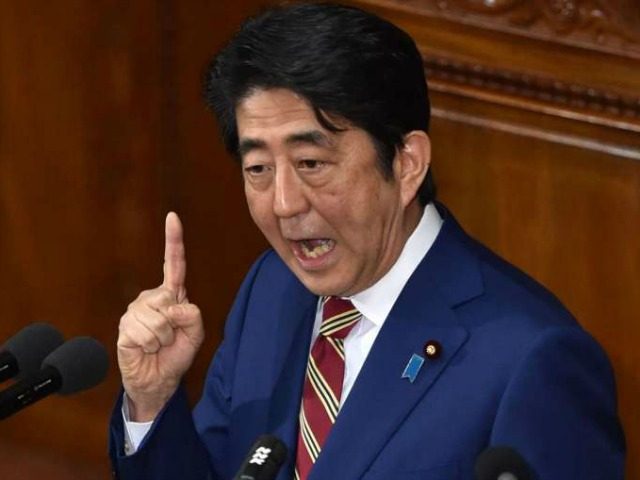Japanese Prime Minister Shinzo Abe told the U.N. General Assembly on Wednesday that North Korea’s nuclear and missile threat had reached a new “dimension,” menacing the peace of the entire region and meriting the strongest response from the Security Council.
“Mr. President, North Korea has now manifested itself directly before us as an open threat to peace. What can we do in response? The raison d’etre of the United Nations is now truly being tested,” Abe said.
“North Korea launched SLBMs,” Abe continued, referring to Pyongyang’s submarine-launched ballistic missile test. “Immediately after that, it fired three ballistic missiles simultaneously, each traversing 1,000 kilometers to reach Japan’s exclusive economic zone. It is purely a matter of good fortune that no commercial aircraft or ships suffered any damage during this incident.”
He noted this brought the total of North Korean ballistic missile launches for 2016 to 21, not to mention their nuclear bomb tests in January and September. He said these tests “change the landscape completely.”
“Right before our eyes, North Korea is carrying out a plan about which there can be no doubt. There is no alternative but to say that the threat has now reached a dimension altogether different from what has transpired until now,” Abe declared.
He spoke of contacting the presidents of the United States and South Korea to arrange “close coordination” and a “resolute attitude” toward North Korea’s transgressions and said it was now time for the U.N. Security Council to “indicate an unmistakable attitude towards this threat of a new dimension.”
“This is a challenge posed to the conscience of humankind. Were we to overlook it, how would we justify it to our own consciences?” Abe asked.
He used a poetic metaphor to describe the threat North Korea poses to regional and world peace:
Peace is something very much like glass. When well-polished and transparent, we are not conscious of its presence. And a small crack can be overlooked for a while without giving rise to any changes.
But before you know it, the crack expands, and the glass in time shatters with a crash. That is why, day in and day out, we must continuously foster the habit of mind of handling glass with great care, so that no cracks form.
I believe the original intention of the United Nations, created in the wake of two world wars, was that kind of keen awareness.
For that very reason, it would simply be unacceptable to continue to tolerate military provocation. It isb ecause that would be an act equivalent to openly, and in broad daylight, setting a crack into glass.
Abe referenced North Korea’s long campaign of abducting Japanese citizens, and its endless violation of its own citizens’ human rights, to warn about the danger of such a malevolent entity gaining access to nuclear missiles, especially the kind that can be launched from submarines.
He said it was the “absolutely unfailing” and single-minded wish of the Japanese people for “world peace and the elimination of nuclear weapons,” a “pledge to be passed down for generations not to stop walking along the path which would make that a reality.”
Citing the scale of Japan’s contributions to the United Nations, which exceed those of all other countries except the United States over the past 30 years, and the benefits other Asian nations have enjoyed from Japan’s support for democracy — and sizable financial investments — Abe called for resolute action against both North Korea and another regional menace he didn’t name directly: China.
Peace, stability, and security of the seas as well as freedom of navigation and overflight are the basis for the peace and prosperity of the international community.
Should there be disputes, the international community must adhere strictly to the principles that states shall make their claims based on international law, they shall not use force or coercion in trying to drive their claims, and they shall seek to settle disputes by peaceful means.
South Korea and the U.S. found an entirely different way to send a message to North Korea on Wednesday, as a South Korean official announced the two nations would “conduct a mock attack on a nuclear facility next month,” as reported by CNN.
The official said there would also be drills to respond to sudden missile attacks.
Of course, care was taken to state that these drills are “not aimed particularly at North Korea.” Pyongyang nevertheless responded to news of these exercises by denouncing the South Koreans as “puppet warmongers.”
North Korea’s state-run KCNA media said Seoul was “frightened by the daily increasing might of the DPRK,” and warned that “remarks made by its dirty mouths and racket of confrontation with the DPRK would precipitate its miserable destruction.”
The United States also announced on Wednesday that it had conducted a second flyover of the Korean demilitarized zone with B-1B bombers, to demonstrate that the strength of America’s commitment “will not be shaken by North Korea’s aggressive behavior,” as 7th Air Force commander Lt. General Thomas W. Bergeson put it.

COMMENTS
Please let us know if you're having issues with commenting.